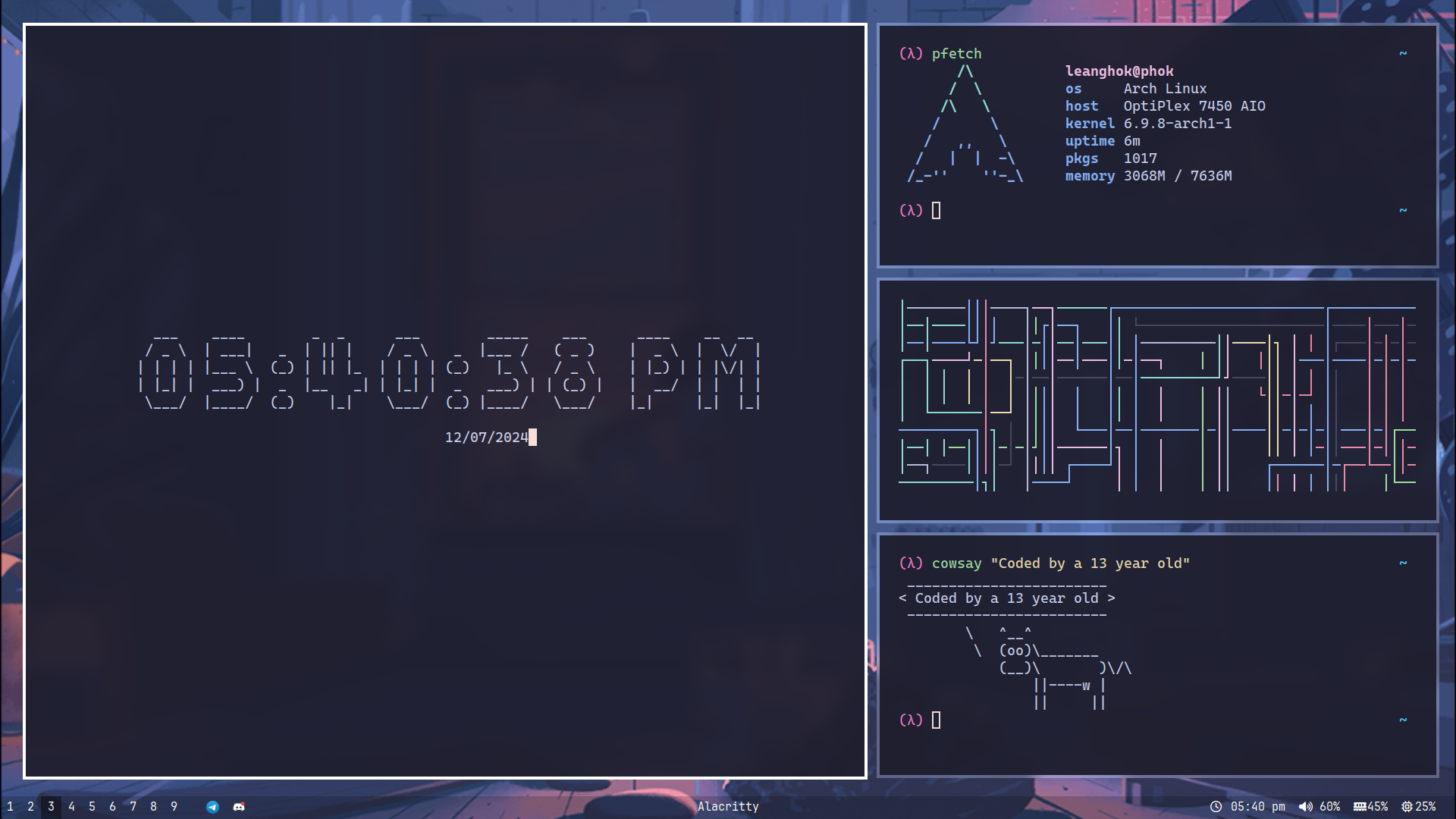Moody is a very minimal, simple, and buggy tiling window manager written in C. Moody's goal is to be minimal and unusable.
- Windows management (moving, resizing)
- Windows tiling
- Windows gaps
- Windows navigation
- Multiple workspaces
- Windows decoration
- Keybindings
- Startup commands
- Configurations
- Focus on hover
- Supports Bar (polybar)
- Fullscreen (buggy)
- Floating windows (buggy)
- Codebase is very messy (Rewriting)
- libx11
- xterm (default terminal)
- rofi (default app launcher)
- Arch
sudo pacman -S libx11 libxrandr libxinerama libxcursor libxext libxt xorg-server-devel xterm rofi- Ubuntu/Debian
sudo apt-get install -y libx11-dev libxrandr-dev libxinerama-dev libxcursor-dev libxext-dev libxt-dev xorg-dev xterm- Fedora/Red Hat
sudo dnf install -y libX11-devel libXrandr-devel libXinerama-devel libXcursor-devel libXext-devel libXt-devel xorg-x11-server-devel xtermclone the repo and build moody from source
git clone https://github.com/leanghok120/moody.git
cd moody
rm -rf .gitmake sure you're in the moody directory and run:
sudo make clean build installMoody is configured in pure C, although this may sound scary, the config.h file is super simple to understand. After configuring everything u need, just compile everything with sudo make build install and restart moody.
Startup commands are commands that launch when moody starts up, these could be commands to set a wallpaper, open a program and more.
To set startup commands, just put the commands in autostart.sh and moody will run autostart.sh on startup. Example:
# autostart.sh
nitrogen --restore
xtermThis will set your wallpaper (using nitrogen) and open up xterm on moody's startup
You can configure keybindings in the config.h file. There are 2 types of keybindings in moody, keybindings to run commands and keybindings to interact with moody.
A command keybinding is a keybinding that executes a command when triggered, and this is how you would configure it.
static Keybinding keybindings[] = {
{ XK_Return, MODIFIER, "xterm", -1 }, // mod+return to open xterm (terminal)
{ XK_B, MODIFIER, "firefox", -1 }, // mod+b to open firefox
{ XK_space, MODIFIER, "rofi -show drun", -1 }, // mod+space to open rofi (app launcher)
{ XK_F12, MODIFIER, "pactl set-sink-volume @DEFAULT_SINK@ +5%" }, // mod+f12 to increase volume by 5%
{ XK_F11, MODIFIER, "pactl set-sink-volume @DEFAULT_SINK@ -5%" }, // mod+f11 to increase volume by 5%
{ XK_F10, MODIFIER, "pactl set-sink-mute @DEFAULT_SINK@ toggle" }, // mod+f10 to mute
// Workspace
{ XK_1, MODIFIER, NULL, 0 }, // mod+1 to switch to workspace 1
{ XK_2, MODIFIER, NULL, 1 }, // mod+2 to switch to workspace 2
{ XK_3, MODIFIER, NULL, 2 }, // mod+3 to switch to workspace 3
{ XK_4, MODIFIER, NULL, 3 }, // mod+4 to switch to workspace 4
{ XK_5, MODIFIER, NULL, 4 }, // mod+5 to switch to workspace 5
{ XK_6, MODIFIER, NULL, 5 }, // mod+6 to switch to workspace 6
{ XK_7, MODIFIER, NULL, 6 }, // mod+7 to switch to workspace 7
{ XK_8, MODIFIER, NULL, 7 }, // mod+8 to switch to workspace 8
{ XK_9, MODIFIER, NULL, 8 } // mod+9 to switch to workspace 9
};Moody keybindings are keybindings that interact with moody, such as killing windows, focusing windows. This is how you would configure them:
#define KILL_KEY XK_q // mod+q for killing the current window
#define NEXT_WINDOW_KEY XK_k // mod+k to focus next window
#define PREV_WINDOW_KEY XK_j // mod+j to focus previous windowI got this idea of creating my own tiling windows manager in a dream. After I woke up, I decided to create moody since I had no projects to work on. moody is inspired by dwm and ragnarwm
